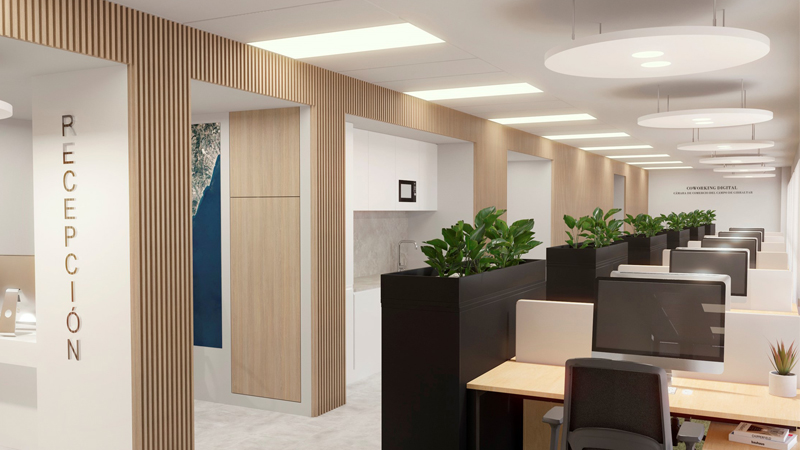
As artificial intelligence and automation advance, what lies ahead for our cherished coworking spaces? In just a few short years, these hubs have become favorites for both employees and companies. But can they evolve with this new wave of technological change by embracing even more radical shifts in their business models? Will robots join us in the office? Could AI become our next colleague? Dive into the potential futures of these iconic collaborative work environments and explore how AI is redefining how we share and utilize our professional spaces. Join the discussion on the future of work and learn how to stay relevant in this era of technological transformation!
The New Technological Revolution in the Workplace
Since the internet revolution of the 2000s and the subsequent digital wave, with its widespread adoption of internet-related tools and technologies, new information and communication technologies (NICTs) have had a profound impact on our lives and social behaviors, reshaping society as a whole.
Digital transformation has also redefined the look and feel of our workspaces, our tools, and our internal processes. Today, nearly half of the French workforce and two-thirds of employees globally are embracing flexible work arrangements outside the traditional office, often within coworking spaces. Coworking has emerged as a response to the evolving needs of workers, prioritizing flexibility, collaboration, and community.
Simultaneously, geographical distances are becoming less relevant, enabling effective collaboration between individuals spread across multiple locations, yet connected through digital headquarters solutions. Laptops and smartphones have become the new symbols of work.
Coworking spaces are adjusting to the increasing demand for flexibility and autonomy. However, the evolution doesn’t end here. With the rise of cutting-edge technologies such as AI and automation, we’re already glimpsing the major transformations ahead.
How is AI Transforming Coworking Spaces?
It’s fascinating to see how AI and automation are already being considered as tools to greatly simplify the management of coworking spaces by taking over various administrative and logistical tasks, for instance.
Functions such as room booking, access control, and predictive maintenance could be automated, providing benefits in efficiency and reducing the human workload. However, this automation also raises concerns about its impact on employment. While some roles may be automated, the hope is that new professional opportunities will emerge. People will still be needed to manage these spaces, but perhaps the roles of coworking managers or hospitality managers will become more digitally connected. Clémence, a Coworking Manager at Hiptown, touched on these issues in a previous interview with the workin.space team: “I believe the future of coworking centers will increasingly focus on services and support. My job will likely evolve towards something more cross-functional, with a greater emphasis on metrics.”
Keeping a close watch on this evolution is crucial, as it will require adapting training and skill development to meet the changes in the labor market brought on by automation.
Balancing the automation of repetitive tasks with the creation of new, high-quality job opportunities remains a key consideration in this context.
The Human Role in the Age of AI
Despite the excitement that AI generates among companies and employees, it also brings several concerns that will need to be addressed over time. A May 2023 survey by Sapio Research revealed that 44% of employees see AI as a means to greater professional efficiency, particularly through the gradual elimination of administrative and low-value tasks. However, 49% fear that AI could eventually replace them in their jobs, and 62% believe that the lack of human interaction could negatively affect their work quality.
Jeremy Rifkin, an American essayist and theorist of the “third industrial revolution,” weighs in on these findings, sharing his vision of new AI technologies and their potential impact on the workplace. He asserts that, much like the previous revolution, we are under a delusion: “AI is just a tool, not a substitute for humans.”
While AI and automation are set to transform jobs within the coworking sector, they also offer an opportunity to redefine the human role. Rather than being replaced by these technologies, people could refocus on their unique strengths, such as fostering social connections among users or providing personalized support. These technologies enable us to concentrate on what truly matters!
In this sense, these advancements promise not only to improve the management and use of spaces but also to enhance the user experience through greater personalization. However, it is essential to ensure that this technological shift is handled with care to maximize the benefits without losing the fundamental element that defines the strength of the coworking model: its humanity.
The harmonious coexistence of AI, automation, and the human touch in coworking spaces appears to be the key to addressing future challenges while maximizing the benefits of these technological advances. By continuing to promote flexibility, collaboration, and adaptability, coworking spaces can remain vital catalysts for the positive evolution of the workplace in the age of technological transformation. By embracing these changes with foresight, coworking has the potential to reinvent its role and remain a central player in the ongoing evolution of the professional landscape.
Source: https://workin.space/en/news/coworking-spaces-in-the-age-of-ai-adapt-or-disappear
